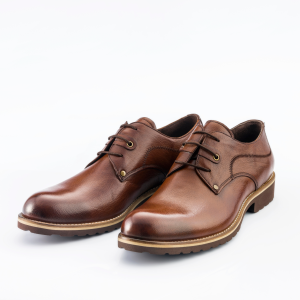I’m so sorry for your loss.
A mourner is not to wear leather shoes from after the burial. This applies until the end of the shiva period. The injunction prohibiting leather shoes can be understood on multiple levels. Every morning we recite a blessing through which we thank G-d for providing us with shoes. The text of the blessing seems strange: “Blessed are You, God, Who has provided me with all my needs.” Why would we thank G-d for shoes using the terminology of “all my needs”? It would seem that what we gain by wearing shoes encompasses, in some way, all of our needs. This needs explanation.
Shoes represent our ability to move forth in the world, to walk along the steps that G-d has ordained for us to move ahead in our lives and be productive. The previous blessings thank G-d for waking us up, giving us the strength to sit up and get out of bed as free individuals who are able to make choices with our lives. We are created in the image of G-d, giving us the ability to not only carve out our lives, but to make a difference in the world and help perfect it. That is why shoes are considered “all my needs,” as they reflect our ability to walk ahead with full force, unimpeded by the rocks and sharp items on the way. We can step right on those objects and keep moving ahead.
Shoes, in rabbinic literature, are always leather. Shoes of leather represent man’s dominion over the universe, as these shoes were created with the skin of the animal. After the flood, when Noah saved the animal kingdom in the ark, Mankind was endowed with a G-d-given license to control and utilize animals for our needs. This brought man’s creation in the “image of G-d” to a new level, exercising control over all living things. Taking steps ahead – in shoes created by the dominion of man over the world and the animal kingdom – represents the ultimate manifestation of the power of man.
In Torah life, there are times to express power – and times to emphasize humility. Times of mourning, when we have lost a loved one, is one of the times we shed our power, and bow our heads to the ultimate justice of the Almighty. A mourner recites the blessing “Blessed are You, G-d, … the True Judge”. This is a time which a mourner subjugates what seems true and just to him, to that of the Ultimate Judge who sees things from a very different vantage point. We express the shedding of our own power and acceded to the power of G-d by removing our leather shoes. For this reason, we collectively remove our shoes as a nation on Tisha B’av, the day of national mourning over the destruction of the Temples in Jerusalem and all subsequent calamities in our history. In this way we express, as an entire nation, our acceptance of the will of G-d and His ultimate dominion and judgement.
There is also a deeper, Kabbalistic understanding of this law. The Torah says that man was created by G-d’s breathing the breath of life into his nostrils (Genesis/Braeshith 2:7). This “breath” (neshima) is called the “neshama” or soul. The Kabbalah explains that there are various “parts” to the soul:
- The highest part, the “root” of the soul, resides in the highest of the transcendental spiritual worlds.
- The lowest part of the soul resides in our physical bodies, down in the physical world.
For this reason, the body is referred to in Kabbalistic literature as a “na’al” or shoe. Just like most of the body resides above ground, and only the lowest part, the feet, reside in the shoes; so too most of the neshama resides above, and just the lowest part resides in its “shoe” (the body). Therefore, when we reach transcendent levels of connection with G-d, we are commanded to remove our shoes:
- Moses was told by G-d to remove his shoes at the burning bush (Exodus/Shemos 3:5).
- The Kohanim/Priests serve G-d in the Temple without shoes, and all visitors must remove their shoes when they enter the Temple Mount to connect to G-d.
- Prophets removed their shoes when speaking to G-d.
- All Jews are commanded to remove their shoes on Yom Kippur, when the entire nation is elevated to be like angels connected to G-d on the highest level, as is outlined in the Code of Jewish Law.
All these cases are situations where we transcend our bodies( our “shoes”) and rise to higher levels. At the time of death, the soul connects to G-d in such an intimate way that it can no longer stay in its physical body. For that reason, it leaves the body, shedding its “shoe” completely. The mourners, in order to commemorate that connection that the soul of their loved one has attained, sit in a low place without their shoes. This is a reminder that all life comes to an end, but the end is also the beginning of an eternity.
I bless you with the traditional blessing: “May you be comforted among the mourners of Zion and Jerusalem”, and may you know many simchas in the future.
Sincerely,
Rabbi Yerachmiel Fried



